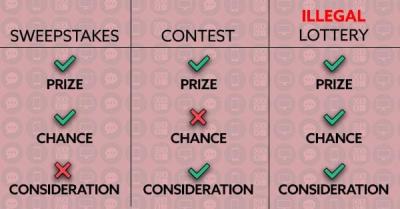 Sponsoring a sweepstakes or contest can provide a long list of unique benefits for any business, but if you are diving in for the first time, it is important to become familiar the concepts of “prize,” “chance,” and “consideration” to differentiate between the types of prize promotions and to understand the regulations that control them. To briefly introduce these elements:
Sponsoring a sweepstakes or contest can provide a long list of unique benefits for any business, but if you are diving in for the first time, it is important to become familiar the concepts of “prize,” “chance,” and “consideration” to differentiate between the types of prize promotions and to understand the regulations that control them. To briefly introduce these elements:
- Prize: Anything of tangible value that will be awarded to a winner or winners.
- Chance: Winners are determined by chance, usually a random drawing.
- Consideration: Purchase of a product or service, a payment or extensive effort needed to participate in the promotion.
To run a legal promotion, one of the above elements (Prize, Chance or Consideration) needs to be eliminated.
- A sweepstakes is a promotion that includes prize and chance, but eliminates consideration by offering a free method of entry.
- A contest is a promotion that includes a prize, but eliminates the chance by determining winners based on skill. You can require purchase or payment to enter in most states, but there are a few exceptions.
Understanding how prize, chance and consideration affect your upcoming promotion is crucial to avoiding issues with legality and regulation. While prize and chance are fairly straight-forward concepts, the idea of consideration may confuse those not familiar with sweepstakes and contest law. To better understand consideration and how it may affect the legality of your promotion, let’s dig deeper:
Monetary Consideration vs. Non-Monetary Consideration
- Monetary Consideration refers to the purchase of a product, service or any other entry fee that is required to enter a promotion.
- Non-Monetary Consideration refers to any substantial time or effort which entrants must expend while entering the promotion, and that benefits the sponsor in some direct way.
When it comes to legality and regulation, the definition of consideration varies from state to state. Some states limit the definition to only include monetary consideration, while others do not – thereby allowing those states to include non-monetary requirements as consideration. Further complicating the matter, some states are considered “neutral,” and do not clearly define their definition of consideration so they may recognize either form.
US Sweepstakes understands that these varying regulations from state to state can be confusing, so it is our commitment to ensure that you understand exactly which regulations could affect your promotion (and how to work around them) during the planning phase.
Alternate Methods of Entry (AMOE’s)
You may be familiar with the phrase “no purchase necessary” in connection with sweepstakes, which is required for compliance with the lottery laws that govern sweepstakes. If you are concerned that your idea for a sweepstakes might be illegal due to the presence of consideration, you have the option to offer an Alternate Method of Entry, or “AMOE.”
US Sweepstakes covers AMOE’s more in depth in our blog post, “How to Utilize a Sweepstakes to Drive Sales,” but basically, an AMOE is an additional method of entry that does not require any monetary or non-monetary consideration to enter. Common examples of AMOE’s include mail-in entry or an online entry form.
Ready to get your next promotion up and running? Have follow-up questions regarding prize, chance, and consideration? US Sweepstakes will help you from the development phase of your promotion through prize fulfillment, and everything in between. Click here to contact us today and benefit from our years of experience in the promotions industry.




